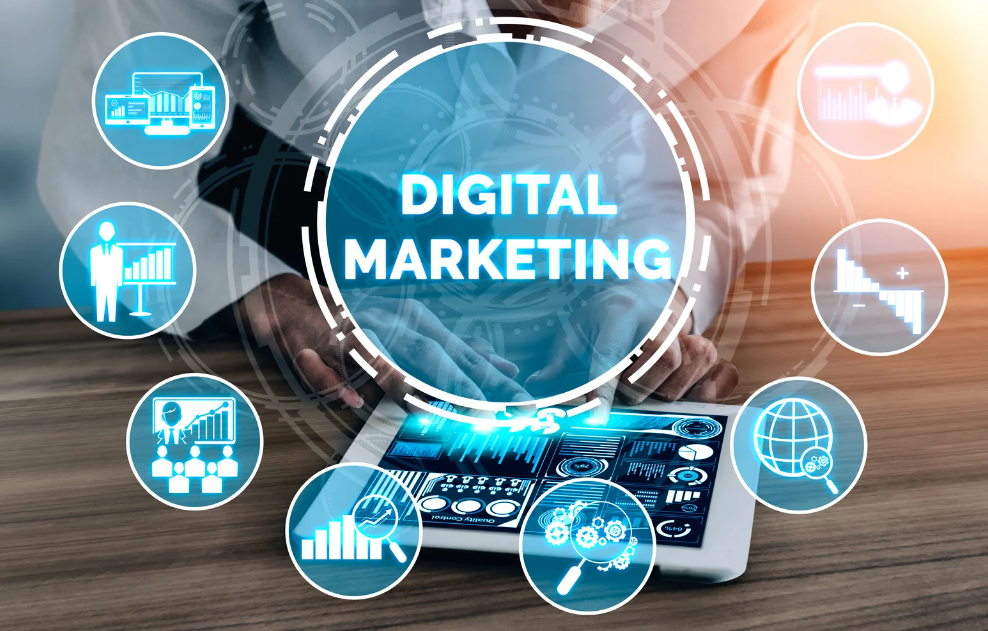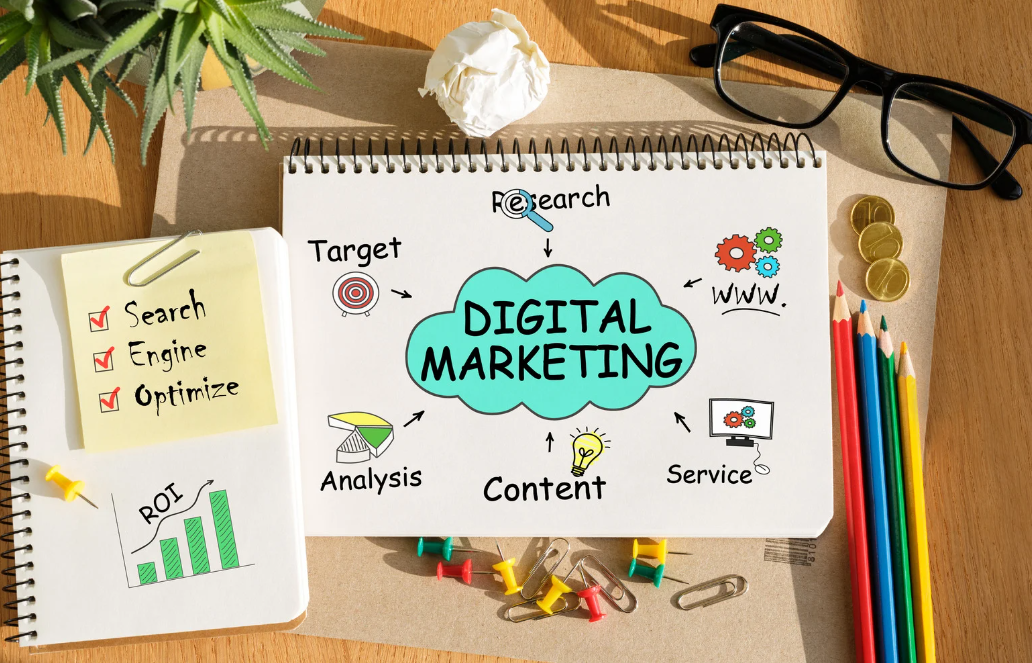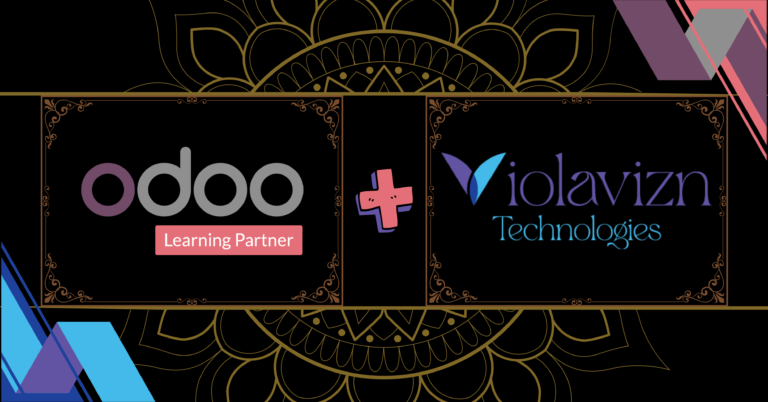Skills That Make You A Proficient Digital Marketer

Digital Marketing refers to the use of digital channels, platforms, and technologies to promote and advertise products, services, or brands to a targeted audience. It encompasses a broad range of marketing activities and strategies that leverage the internet and electronic devices to connect with consumers.
This involves using online platforms like search engines, social media, email, and websites to promote products and services. Key techniques include SEO, content marketing, social media marketing, and email marketing.
Origins:
- 1980s-1990s: The internet’s foundation and the World Wide Web’s creation in 1989 set the stage.
- 1994: The first clickable web banner ad by AT&T marks the start of online advertising.
- 1990s: Search engines like Yahoo (1994) and Google (1998) drive the need for SEO.
- Late 1990s: Email marketing begins with mass promotional emails.
- 2000s: Social media platforms like MySpace, Facebook, and Twitter revolutionize engagement.
- 2007: The smartphone revolution boosts mobile marketing.
- 2010s: Big data and advanced analytics enable personalized, data-driven marketing.
- Present: AI and automation further refine targeting and customer experiences.
Digital marketing has evolved from simple online ads to sophisticated, data-driven strategies, continuously adapting to technological advances and changing consumer behaviors.
Becoming a proficient digital marketer requires a diverse set of skills that span various aspects of online marketing, from content creation to data analysis. Here are some of the key skills that can help you excel in digital marketing:
1. Content Creation
- Copywriting: Ability to write compelling and engaging copy for different platforms, including social media, blogs, emails, and advertisements.
- Visual Design: Understanding basic design principles and tools like Adobe Photoshop or Canva to create visually appealing graphics.
- Video Production: Skills in creating and editing videos, which are increasingly important for engaging content.
2. SEO (Search Engine Optimization)
- Keyword Research: Identifying the right keywords to target for organic search traffic.
- On-Page SEO: Optimizing website content and HTML elements to improve search engine rankings.
- Technical SEO: Understanding the technical aspects of a website, such as site speed, mobile-friendliness, and crawlability.
3. Data Analysis
- Analytics Tools: Proficiency in using tools like Google Analytics, SEMrush, or Ahrefs to analyze web traffic and campaign performance.
- Data Interpretation: Ability to interpret data and generate actionable insights to improve marketing strategies.
- A/B Testing: Conducting experiments to determine the most effective marketing strategies.
4. Social Media Marketing
- Platform Expertise: Knowing the intricacies of different social media platforms (Facebook, Instagram, Twitter, LinkedIn, etc.) and how to leverage them for marketing purposes.
- Engagement Strategies: Developing strategies to engage with the audience, foster community, and build brand loyalty.
- Social Media Advertising: Running and optimizing paid campaigns on social media platforms.
5. Email Marketing
- Campaign Management: Creating and managing email marketing campaigns, from design to delivery.
- List Management: Growing and segmenting email lists to target the right audience.
- Automation: Using email marketing tools like Mailchimp or HubSpot for automation and personalized messaging.
6. Paid Advertising (PPC)
- Google Ads: Managing and optimizing PPC campaigns on Google.
- Social Media Ads: Running effective ad campaigns on social media platforms.
- Budget Management: Allocating and optimizing budgets to maximize ROI.
7. Conversion Rate Optimization (CRO)
- User Experience (UX) Design: Improving the user experience to increase conversion rates.
- Landing Page Optimization: Creating and testing landing pages to maximize conversions.
- Call-to-Action (CTA) Design: Crafting compelling CTAs that drive user action.
8. CRM (Customer Relationship Management)
- CRM Tools: Using CRM software like Salesforce or HubSpot to manage customer interactions and data.
- Customer Segmentation: Segmenting customers for targeted marketing efforts.
- Personalization: Creating personalized marketing messages based on customer data.
9. Technical Skills
- Basic Coding: Understanding HTML, CSS, and JavaScript can be helpful for implementing and troubleshooting marketing campaigns.
- Marketing Automation: Using tools like Marketo, Pardot, or ActiveCampaign to automate repetitive tasks.
10. Project Management
- Planning: Creating detailed marketing plans and timelines.
- Coordination: Coordinating with different teams and stakeholders to ensure cohesive campaign execution.
- Adaptability: Being flexible and able to pivot strategies based on performance data and changing trends.
11. Communication and Collaboration
- Effective Communication: Clearly conveying ideas and strategies to team members, stakeholders, and clients.
- Collaboration: Working well with others, including cross-functional teams like sales, design, and development.
12. Continuous Learning
- Staying Updated: Keeping up with the latest trends, tools, and best practices in digital marketing.
- Certifications: Earning certifications from recognized institutions (e.g., Google Analytics, HubSpot, Facebook Blueprint) to validate your skills.
13. Influencer Marketing
- Identifying Influencers: Finding and evaluating potential influencers who align with your brand.
- Campaign Management: Developing and managing influencer marketing campaigns.
- Relationship Building: Building and maintaining relationships with influencers for long-term partnerships.
14. Customer Journey Mapping
- Understanding Customer Personas: Creating detailed profiles of your target audience.
- Mapping Touchpoints: Identifying and optimizing all points of interaction a customer has with your brand.
- Journey Optimization: Continuously improving the customer journey to enhance satisfaction and conversion rates.
15. Voice Search Optimization
- Voice SEO: Optimizing content for voice search queries.
- Natural Language Processing (NLP): Understanding how people use voice search and adjusting strategies accordingly.
16. E-commerce Marketing
- Product Listings: Optimizing product listings for search engines and user experience.
- Conversion Funnels: Creating and optimizing funnels specifically for e-commerce.
- Retargeting: Using retargeting techniques to bring back potential customers who have shown interest.
17. Mobile Marketing
- Mobile Optimization: Ensuring that all marketing efforts are optimized for mobile devices.
- App Marketing: Promoting mobile apps through various channels.
- SMS Marketing: Utilizing SMS for direct and immediate customer communication.
18. Affiliate Marketing
- Program Management: Setting up and managing affiliate marketing programs.
- Partner Relationships: Building relationships with affiliates and optimizing their performance.
- Commission Structures: Designing effective commission structures to motivate affiliates.
19. Ethical Marketing and Compliance
- Regulatory Knowledge: Understanding and adhering to regulations such as GDPR, CCPA, and CAN-SPAM.
- Ethical Practices: Implementing ethical marketing practices to build trust and avoid penalties.
- Privacy Policies: Developing and maintaining clear privacy policies to protect customer data.
20. Community Management
- Forum Management: Managing and engaging with online communities and forums.
- User-Generated Content (UGC): Encouraging and leveraging UGC to build community and authenticity.
- Feedback Loop: Creating systems to gather and respond to customer feedback effectively.
21. Event Marketing
- Webinars and Virtual Events: Planning and executing online events to engage with audiences.
- Event Promotion: Using digital channels to promote and drive attendance to events.
- Post-Event Follow-Up: Following up with attendees to nurture leads and build relationships.
22. Growth Hacking
- Innovative Strategies: Implementing creative and cost-effective strategies to drive rapid growth.
- Metric-Driven: Focusing on key growth metrics to guide marketing efforts.
- Iterative Testing: Continuously experimenting and iterating to find the most effective growth tactics.
23. Networking and Industry Engagement
- Professional Networking: Building a network of industry contacts for collaboration and opportunities.
- Industry Engagement: Participating in industry events, webinars, and forums to stay connected and informed.
24. Local SEO
- Local Listings: Optimizing your business for local search results.
- Google My Business: Effectively managing and optimizing your Google My Business profile.
- Local Reviews: Encouraging and managing reviews from local customers.
25. Blockchain and Cryptocurrency Marketing
- Understanding Blockchain: Grasping the basics of blockchain technology and its implications for marketing.
- Crypto Marketing: Promoting blockchain and cryptocurrency projects through specialized channels.
- Regulatory Compliance: Navigating the regulatory landscape for cryptocurrency marketing.
Conclusion
By mastering these skills, you can position yourself as a proficient digital marketer capable of driving results and adapting to the ever-evolving digital landscape. The key to success in digital marketing lies in continuous learning and staying updated with the latest trends and technologies. This will ensure you remain effective in your strategies and can deliver significant value to your organization or clients.




